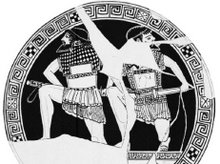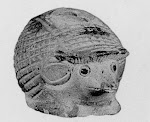Recently, a friend of mine, Helena Schrader, who has written many novels set in ancient Sparta with an eye towards dispelling much of the mirage that has been built up around Spartan history, asked me a question on something I posted on her website. I decided to turn her question into a guest spot, giving you both her initial question and my response. Many of you have already followed the link from my site her hers, and I recommend those that have not done so take the opportunity now. She has a new trilogy coming out centered on Leonidas's life.
I mentioned a Helot revolt in 490 BC that may have been the real cause for the Spartan delay that left Athens to face the invasion alone. Her question was as follows:
“What evidence is there for a helot revolt in 490? I have heard it hypothesized that there might have been a helot revolt to explain Sparta's delay in responding to the Athenian plea for assistance against the Persian invasion. But I was not aware of any literary or archeological evidence that supported this thesis. On the contrary, I recently read an account that stressed that no other explanation for the Spartan delay than the one reported by Herodotus (6:106) (waiting for the full moon) was needed. Personally, I have been speculating about another possible reason for the delay - Cleomenes' madness and an internal dispute about who should lead the Spartan army sent to aid Athens. The kings were supposed to command, and Leotychidas does not appear to have been active - or trusted? - as a commander. Cleomenes was going mad - or possibly still in Arkadia. I think internal disagreement about who to put in command might have made it impossible for the Spartans to react promptly, but the desire to keep internal disputes secret made them give the Athenians the excuse of a religious festival. Any way, if you have some strong indicators for the helot revolt, however, I'd be very interested.”
There is one direct reference to a revolt of Helots in 490BC. Plato (Laws 698 D-E) includes the line:
“but when they sent out embassies in every direction to seek aid, all refused, [698e] except the Lacedaemonians; and they were hindered by the war they were then waging against Messene, and possibly by other obstacles, about which we have no information, with the result that they arrived too late by one single day for the battle which took place at Marathon.”
Now, Plato has something of a reputation for paying more attention to his Rhetoric tutors than his history lessons, so of itself his statement is less than compelling. There is a whole suite of circumstantial evidence to back up Plato’s assertion, that in total make an argument that some believe is sufficient to prove a revolt, while others remain unconvinced. Drs. Lazenby and Cawkwell believe in the revolt, while as of the time of his book Sparta and Lakonia: A Regional History, which I draw from for this entry, Dr. Cartledge was agnostic.
First, at Olympia the Spartans dedicated spoils from a war with the Messenians. Pausanias writes that this was dedicated after the second Messenian revolt, which would be the revolt in 465 BC, following the devastation of Sparta by earthquake.
Pausanias, Description of Greece, (5.24.3)
“On the right of the great temple is a Zeus facing the rising of the sun, twelve feet high and dedicated, they say, by the Lacedaemonians, when they entered on a war with the Messenians after their second revolt. On it is an elegiac couplet: “Accept, king, son of Cronus, Olympian Zeus, a lovely image, and have a heart propitious to the Lacedaemonians.”
L. H. Jeffery (JHS, LXVI 1949) showed that the way in which the letters were formed in the dedication could not have been used as late a 465, thus there must have been a “messenian war” before this, but not so early as the first revolt in the early 7th C.
Second, there is a tripod dedicated at Amyclai by Callon to success in a Messenian war. “There are also bronze tripods. The older ones are said to be a tithe of the Messenian war” (Paus. 3.18.7). Callon is thought to have been active at around the turn of the 5th C.
Third, we have a statue dedicated to Zeus, again noted by Pausanias (4.33.2) “The statue of Zeus is the work of Ageladas and was made originally for the Messenian settlers in Naupactus.” But Ageladas worked in the early half of the 5th century and not as late as 460.
Fourth, Anaxilas, an early 5th century Tyrant of Rhegium in southern Italy along with a group of Messenians seized and Zankle in north-eastern Sicily and renamed it Messene in 489-88 BC (E. S. G. Robinson, JHS LXVI 1946).
Fifth, Aristomenes was a Messenian hero from Andania (Paus. 4.14.7). He has been variously dated to the initial subjugation of Messena in the late 8th c, the first revolt some 40 years later, and by the Hellenistic poet Rhianos in his Messeniaka to the late 5th century. A web of evidence including the lives of supposed descendants that has become known as the “Rhianos Hypothesis” supports this later date. For example we are told one of his daughters married Theopompos of Heria, who was an Olympic victor in 284 and 480 BC.
Lastly, there are dedications by ” Messenians” at Delphi in the early 5th century. These and the various instances of the movements of Messenians to colonies could reflect an uprising and its later defeat by the Spartans. Why there should be an uprising at this time is easy to imagine. Surely the Messenians knew by 491 BC that the Persians were coming. One wonders, if the revolt is fact, if it was coup of the Persians or their allies.
There is one last possibility I should mention. Cleomenes I gained the Agiad throne in about 520 BC, and was perhaps one of the most interesting Spartans Kings. As was common with Spartan royalty, he was often at odds with the Spartan legislature. Spartan Kings were severely limited in their power when not on campaign with the army. What they did have were powerful factions within the citizen body politic. More than most, Cleomenes I was ruthless in his politics. His actions led to the famous dethroning and defection of Damaratus to the Persian King’s court.
Later, at a moment of political weakness, his foes attacked, leading him to flee to Arcadia- perhaps by way of Sellasia not Thessaly. There he appears to have been rallying the Arcadians. His modern advocates look to this as a great panhellenic gesture in preparation for facing the Persians. Perhaps I am less generous, but the examples of Damaratus, Lysander, Cleonymus, and his namesake Cleomenes III, all make a direct use of this Arcadian base as a pawn in a power play for Spartan power likely. Remember, this is the man who once famously termed himself an “Achean” in an Athenian temple. If he was rousing Arcadians, is it impossible that there was also some intrigue with Messenians?
Perhaps it was this revolt that prompted the Spartans to bring 7 helots for every Spartan hoplite to the battle of Plataea. Keep your friends close, but your revolting subjects closer…
Further reading:
Sparta and Lakonia: a regional history, 1300-362 BC, Paul Cartledge, Psychology Press, 2002
Cleomenes, G. Cawkwell, Mnemosyne, Fourth Series, Vol. 46 (Nov., 1993)
Discrepancies in olympiad dating and chronological problems of archaic Peloponnesian history, Pamela-Jane Shaw, Volume 166 of Historia. Einzelschriften, Franz Steiner Verlag, 2003
Kleomenes, Marathon, the Helots, and Arkadia, W. P. Wallace, The Journal of Hellenic Studies, Vol. 74 (1954)
Monday, September 20, 2010
Subscribe to:
Post Comments (Atom)





1 comment:
Quite interesting text..
As with most others in this blog,excelent work here.
I find Helena S. an excelent author and revolutionary killer of Spartan mirage. And at least for me the inner political struggle aka no king, seems to be more plausable reason for delay in 490..But of course that very struggle might have been directly connected with that revolt or even caused by it (although revolt was clearly not as succesfull or big as few decades later)
Evidence you presented say something indeed happened, but lack of refference to it is suspicious as to how big and how important was that event.
What I think is later classical and hellenistic,roman historians and authors are have a strange trend of strengthening stereotypes especially for Lakedaimonians and more importantly presenting "facts" and events from archaic age for the first time ?!
Battle of Hyssiae, Spartan marriage peculiarity, baby throwing, and this revolt called no more no less than "war"...appear centuries later and arre mysteriously overlooked by greater historians living much closer to that age..hmmm..not convincing..Some of those were proven wrong,as marriage and babies, some are hugely questioned as Hyssiae for example, and this helot "war" might have been only a mere incident which was not even important to Herodotus,Xenophon,Tuchidides for example...but later became inflated story either by people or by author himself.
Post a Comment